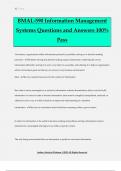1|Page
BMAL-590 Information Management
Systems Questions and Answers 100%
Pass
In business, organizations utilize information primarily in problem-solving or in decision-making
processes - ✔✔Problem-solving and decision-making require information. Gathering the correct
information efficiently, storing it in such a way that it is accessible, and utilizing it to help an organization
achieve its business goals are the keys to success in any business environment.
Data - ✔✔the raw material necessary for the creation of information
Raw data is rarely meaningful or as useful as information without dissemination; data is used to build
information. In order for data to become information, data must be compiled, manipulated, analyzed, or
utilized in such a way in which it leads to an improved understanding of a situation.
information - ✔✔the facts or conclusions derived that have meaning within a given context
In order for information to be useful in decision-making and problem-solving, information must be
presented in a meaningful and logical way within a specific context.
The only thing more harmful than no information is partial or inaccurate information
Author. Katelyn Whitman, ©2025 All Rights Reserved.
,2|Page
system - ✔✔a set of detailed procedures, methods, processes, or course of action intended to achieve a
specific result or carry out a particular activity. Components and parts of a system and interrelated steps
work together for the good of the whole. A successful business attains results that are consistent,
measurable, and ultimately benefit customers.
Subsystem - ✔✔a smaller component of a larger system
Systems thinking - ✔✔Viewing an organization in terms of its subsystems
a complete approach to analysis focusing on the way a system's parts interrelate, and how systems work
over time and within the context of larger systems.
In order to solve problems, managers need to be able to identify the problem, which is done by
recognizing the subsystems in which the problems occur and solving the problems within those
subsystems' constraints and strengths. As an added benefit, systems thinking can also support managers
by keeping them focused on the overall goals and operations of a business. Systems thinking encourages
the manager to consider the entire system, not only their specific subsystem when solving problems or
making decisions.
information technology - ✔✔Systems thinking is supported by information technology
refers to all technologies, especially computers and telecommunications, that collectively facilitate the
building and maintaining of information management systems. Systems thinking is the basic reasoning
behind an organization's dependence on computers and enterprise software applications.
Author. Katelyn Whitman, ©2025 All Rights Reserved.
,3|Page
Enterprise software applications - ✔✔support business systems by ensuring the flow of information
throughout the entire organization.
synergy - ✔✔refers to the combined effects produced by two or more parts, elements, or individuals,
which then produces an effect greater than the totality of their separate effects.
This synergy between computers and humans is the backbone of modern business. Successful companies
will find ways to harness this power to maximize business and organizational success.
Synergy is realized by performing simultaneously and automatically the sequential steps and tasks that
once had to be performed manually.
information management system - ✔✔Managers plan, control, and make decisions and as long as a
system supports one or more of these activities
Transaction processing systems (TPS) - ✔✔most widely used information systems in the world. The
primary function of transaction processing systems is to record data collected where an organization
transacts business with other organizations. TPS's can include point-of-sale (POS) machines, automatic
teller machines (ATM), and purchase order systems.
Business intelligence systems - ✔✔refer to data and software tools for organizing, analyzing, and
providing access to data with the goal of helping managers and other enterprise users make well-
informed decisions. Business intelligence systems address the decision-making needs of all levels of
management within a business.
Supply chain management systems or an SCM system - ✔✔aids a business in the managing or dealings
with suppliers. Suppliers, purchasing businesses, distributors, and logistics companies all benefit from
Author. Katelyn Whitman, ©2025 All Rights Reserved.
, 4|Page
these systems by the sharing of information about orders, production, inventory levels, and delivery of
products and services.
This allows for efficiencies in the sourcing, producing, and delivery of goods and services. SCM systems
are often called Enterprise resource planning (ERP) systems. This is because the information they provide
supports the planning of shipping resources such as personnel, funds, and raw materials.
Supply chain management systems are the result of systems thinking and support systems thinking. They
eliminate the need to reenter data that has already been captured somewhere else in the organization
thereby saving time and money.
customer relationship management (CRM) systems - ✔✔allows the storage and management of prospect
and customer information, like contact information, accounts, and sales opportunities, in one central
location. These systems make information readily available to coordinate all of the business processes
surrounding customers—such as marketing, sales, and service—to increase revenue.
Why do businesses utilize business intelligence systems? - ✔✔focuses on delivering information to
support management decision-making. Business intelligence applications consist of sophisticated
statistical models which are typically personalized for a particular industry or business. They also
typically access large collections of data known as a database. With proper analysis models, business
intelligence systems can identify consumer buying patterns and other valuable business intelligence that
helps managers make decisions in the best interests of the business.
decision support systems (DSSs) - ✔✔rely on models and formulas to produce concise information that
can assist in decision making
Author. Katelyn Whitman, ©2025 All Rights Reserved.




